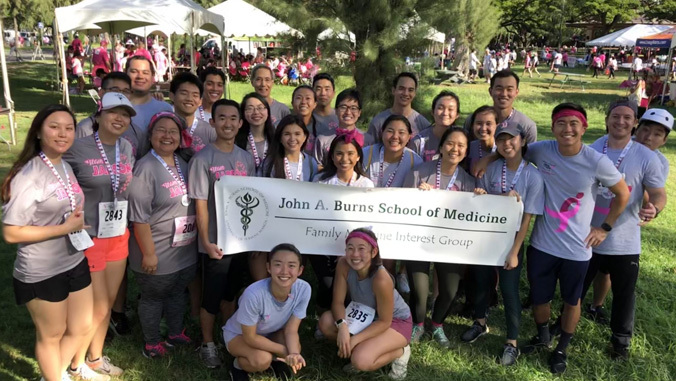
For the first time, the University of Hawaiʻi at Mānoa John A. Burns School of Medicine (JABSOM) was nationally recognized for its student-run Family Medicine Interest Group (FMIG) by the American Academy of Family Physicians.
The JABSOM student organization was selected as one of 18 medical schools to win the 2020 Program of Excellence Award for its exemplary efforts to grow and support interest in family medicine. In addition, JABSOM was one of only two schools nationwide to receive a $600 cash prize.
Among FMIG’s efforts are a school supply drive, a thrift shop and bake sale to support homeless outreach and education, Tar Wars tobacco prevention education for elementary students, and the Hawaiʻi Inter-Island Coalition for Primary Care Pathways, a new program to address the growing physician shortage across the islands. These efforts help improve the future of family medicine and build a vital primary care physician workforce in Hawaiʻi.
“Our JABSOM-FMIG students, especially the executive board, work incredibly hard every year to service our community and to promote primary care to both current students and those in the pipeline. I am so happy that they are finally being recognized for their amazing work and am extremely proud of all of them!” said Jill Omori, FMIG faculty advisor and associate professor of family medicine and community health.
“I hope the JABSOM community can take pride in this award with us and continue supporting us in our efforts to promote family medicine and improve the lives of those in our community,” said EunYoung Park, president of FMIG and a 2023 MD candidate.
FMIG creates opportunities for students to learn about and experience family medicine outside of their medical school curricula through hosted events, workshops, leadership development opportunities, community service and clinical experiences. These award-winning groups are breaking new ground with important initiatives such as starting pipeline programs for students who are underrepresented in medicine and serving their communities during the COVID-19 pandemic.

